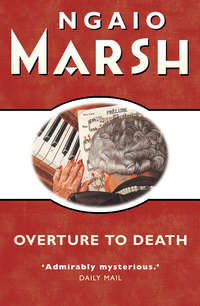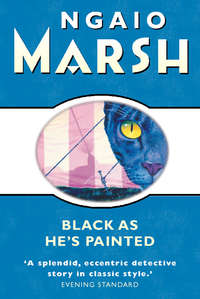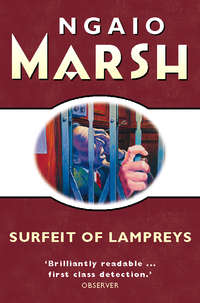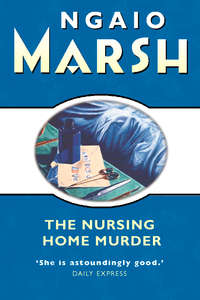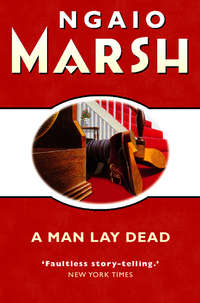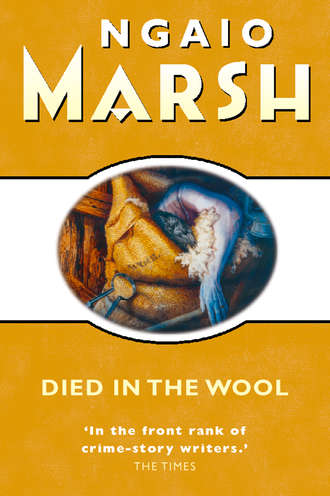
Полная версия
Died in the Wool
‘Does anyone believe in it?’
‘My deceased aunt’s nephew, Douglas Grace, urges it passionately. He wanted to come and meet you in order to press his case but I thought I’d get in first. After all it was I who wrote to you and not Douglas.’
The road they had taken was rough, little more than a pair of wheel tracks separated by a tussocky ridge. It ran up to the foothills of the eastern mountains and skirted them. Far to the west now, midway across the plateau, Alleyn could still see the service car, a clouded point of movement driving south.
‘I didn’t expect you to come,’ said Fabian Losse.
‘No?’
‘No. Of course I wouldn’t have known anything about you if Flossie herself hadn’t told me. That’s rather a curious thought, isn’t it? Horrible in a way. It was not long before it happened that you met, was it? I remember her returning from her lawful parliamentary occasions (you knew, of course, that she was an MP) full of the meeting and of dark hints about your mission in this country. “Of course I tell you nothing that you shouldn’t know but if you imagine there are no fifth columnists in this country …” I think she expected to be put on some secret convention but as far as I know that never came off. Did she invite you to Mount Moon?’
‘Yes. It was extremely kind of her. Unfortunately, at the moment …’
‘I know, I know. More pressing business. We pictured you in a false beard, dodging round geysers.’
Alleyn grinned. ‘You can eliminate the false beard, at least,’ he said.
‘But not the geysers? However, curiosity, as Flossie would have said, is the most potent weapon in the fifth-column armoury. Flossie was my aunt by marriage, you know,’ Fabian added unexpectedly. ‘Her husband, the ever-patient Arthur, was my blood uncle, if that’s the correct expression. He survived her by three months: Curious, isn’t it? In spite of his chronic endocarditis, Flossie, alive, did him no serious damage. Dead, she polished him off completely. I hope you don’t think me very heartless.’
‘I was wondering,’ Alleyn murmured, ‘if Mrs Rubrick’s death was a shock only to her husband.’
‘Well, hardly that,’ Fabian began and then glanced sharply at his guest. ‘You mean you think that because I’m suffering from shock, I adopt a gay ruthlessness to mask my lacerated nerves?’ He drove for a few moments in silence and then, speaking very rapidly and on a high note, he said: If your aunt by marriage turned up in a highly compressed state in the middle of a wool bale, would you be able to pass it off with the most accomplished sang-froid? Or would you? Perhaps, in your profession, you would.’ He waited and then said very quickly, as if he uttered an indecency, ‘I had to identify her.’
‘Don’t you think,’ Alleyn said, ‘that this is a good moment to tell me the whole story, from the beginning?’
‘That was my idea, of course. Do forgive me. I’m afraid my instinct is to regard you as omniscience itself. An oracle. To be consulted rather than informed. How much, by the way, do you know?’
Alleyn, who had had his share of precious young moderns, wondered if this particular specimen was habitually so disjointed in speech and manner. He knew that Fabian Losse had seen war service. He wondered what had sent him to New Zealand and whether, as Fabian himself had suggested, he was, in truth, suffering from shock.
‘I mean,’ Fabian was saying, ‘it’s no use my filling you up with vain repetitions.’
‘When I decided to come,’ said Alleyn, ‘I naturally looked up the case. On my way here I had an exhaustive session with Sub-Inspector Jackson who, as of course you know, is the officer in charge of the investigation.’
‘All he was entitled to do,’ said Fabian with some heat, ‘was to burst into sobs and turn away his face. Did he, by any chance, show you his notes?’
‘I was given full access to the files.’
‘I couldn’t be more sorry for you. And I must say that in comparison with the files even my account may seem a model of lucidity.’
‘At any rate,’ said Alleyn placidly, ‘let’s have it. Pretend I’ve heard nothing.’
He waited while Fabian, driving at fifty miles an hour, lit a cigarette, striking the match across the windscreen and shaking it out carefully before throwing it into the dry tussock.
‘On the evening of the last Thursday in January, 1942,’ he began, with the air of repeating something he had memorized, ‘my aunt by marriage, Florence Rubrick, together with Arthur Rubrick (her husband and my uncle), Douglas Grace (her own nephew), Miss Terence Lynne (her secretary), Miss Ursula Harme (her ward), and me, sat on the tennis lawn at Mount Moon and made arrangements for a patriotic gathering to be held, ten days later, in the wool-shed. In addition to being our member, Flossie was also president of a local rehabilitation committee, set up by herself to propagate the gospel of turning good soldiers into bewildered farmers. The meeting was to be given tea, beer, and a dance. Flossie, stationed on an improvised rostrum hard by the wool-press, was to address them for three-quarters of an hour. She was a remorseless orator, was Flossie. This she planned, sitting in a deck-chair on the tennis lawn. It may give you some idea of her character when I tell you she began with the announcement that in ten minutes she was going to the wool-shed to try her voice. We were exhausted. The evening was stiflingly hot. Flossie, who was fond of saying she thought best when walking, had marched us up and down the rose garden and had not spared us the glass houses and the raspberry canes. Wan with heat and already exhausted by an after-dinner set of tennis, we had trotted at her heels, unwilling acolytes. During this promenade she had worn a long diaphanous coat garnished with two diamond clips. When we were at last allowed to sit down, Flossie, heated with exercise and embryonic oratory, had peeled off this garment and thrown it over the back of the deck-chair. Some twenty minutes later, when she was about to resume the garment, one of the diamond clips was missing. Douglas, blast him, discovered the loss while he was helping Flossie into her coat and, like a damned officious booby, immediately came over all efficient and said we’d look for it. With fainting hearts we suffered ourselves to be organized into a search party; this one to the rose-beds, that to the cucumber frames. My lot fell among the vegetable marrows. Flossie, encouraged by Douglas, was most insistent that we separate and cover the ground exhaustively. She had the infernal cheek to announce that she was going off to the wool-shed to practise her speech and was not to be disturbed. She marched off down a long path, bordered with lavender, and that, as far as we know, was the last time she was seen alive.’
Fabian paused, looked at Alleyn out of the corners of his eyes, and inhaled a deep draught of smoke. ‘I had forgotten the classic exception,’ he said. ‘The last time she was seen alive, except by her murderer. She turned up some three weeks later at Messrs Riven Brothers’ wool store, baled up among the Mount Moon fleeces, poor thing. Did I forget to say we were shearing at the time of her disappearance? But of course you know all that.’
‘You followed her instructions about hunting for the clip?’
Fabian did not answer immediately. ‘With waning enthusiasm, on my part, at least,’ he said. ‘But, yes. We hunted for about forty-five minutes. Just as it was getting too dark to continue, the clip was found by Arthur, her husband, in a clump of zinnias that he had already ransacked a dozen times. Faint with our search, we returned to the house and the others drank whiskies and sodas in the dining-room. Unfortunately, I’m not allowed alcohol. Ursula Harme hurried away to return the clip to Flossie. The wool-shed was in darkness. She was not in her drawing-room or her study. When Ursula went up to her bedroom she was confronted by a poisonously arch little notice that Flossie was in the habit of hanging on her door handle when she didn’t want to be disturbed.
“Please don’t knock upon the door,
The only answer is a snore.”
‘Disgusted but not altogether surprised, Ursula stole away, but not before she had scribbled the good news on a piece of paper and slipped it under the door. She returned and told us what she had done. We went to our beds believing Flossie to be in hers. Shall I go on, sir?’
‘Please do.’
‘Flossie was to leave at the crack of dawn for the mail car. Thence by train and ferry she was to travel to the seat of government where normally she would arrive, full of kick and drive, the following morning. On the eve of these departures she always retired early, and woe betide the wretch who disturbed her.’
The track descended into a shingle-bed and the car splashed through a clear race of water. They had drawn nearer to the foothills and now the mountains themselves were close above them. Between desultory boulders and giant tussocks, coloured like torches in sunlight, patches of bare earth lay ruddy in the late afternoon light. In the distance, spires of lombardy poplars appeared above the naked curve of a hill and, beyond them, a twist of blue smoke.
‘Nobody got up on the following morning to see Flossie off,’ said Fabian. ‘The mail car goes through at half-past five. It’s a kind of local arrangement. A farmer eight miles up the road from here runs it. He goes down to the forks three times a week and links up with the government mail car that you caught. Tommy Johns, the manager, usually drove her down to the front gate to catch it. She used to ring up his cottage when she was ready to start. When he didn’t hear from her, he says, he thought one of us had taken her. That’s what he says,’ Fabian repeated. ‘He thought one of us had taken her and didn’t bother. We, of course, never doubted that she had been driven down by him. It was all very neat when you come to think of it. Nobody worried about Flossie. We imagined her happily popping in and out of secret sessions and bobbing up and down at the Speaker. She’d told Arthur she had something to say in open debate. He tuned in to the House of Representatives and appeared to be disappointed when he didn’t hear his wife taking her usual energetic part in the interjections of “what about yourself?” and “sit down” which are so characteristic of the parry and riposte of our parliamentary debates. Flossie, we decided, must be holding her fire. On the day she was supposed to have left here, the communal wool-lorry arrived and collected our bales. I watched them load up.’
A shower of pebbles spattered on the windscreen as they lurched through the dry bed of a creek. Fabian dropped his cigarette on the floor and ground it out with his heel. The knuckles of his hands showed white as he changed his grip on the wheel. He spoke more slowly and with less affectation.
‘I watched the lorry go down the drive. It’s a long stretch. Then I saw it turn into this road, and lurch through this race. There was more water in the race then. It fanned up and shone in the sunlight. Look. You can see the wool-shed now. A long building with an iron roof. The house is out of sight, behind the trees. Can you see the shearing-shed?’
‘Yes. How far away is it?’
‘About four miles. Everything looks uncannily close in this air. We’ll pull up if you don’t mind, I’d rather like to get this finished before we arrive.’
‘By all means.’
When they stopped, the smell and sounds of the plateau blew freshly in at the windows; the smell of sun-warmed tussock and earth and lichen, the sound of grasshoppers and, far away up the hillside, the multiple drone of a mob of sheep in transit, a dreamlike sound.
‘Not,’ said Fabian, ‘that there’s very much more to say. The first inkling we had that anything was wrong came on the fifth evening after she had walked down the lavender path. It took the form of a telegram from one of her brother MPs. He wanted to know why she hadn’t come up for the debate. It gave one the most extraordinarily empty and helpless feeling. We thought, at first, that for some reason she’d changed her mind and not left the South Island. Arthur rang up her club and some of her friends in town. Then he rang up her lawyers. She had an appointment with them and hadn’t kept it. They understood it was about her will. She was prolific of codicils and was always adding bits about what Douglas was to do with odds and ends of silver and jewellery. Then a little procession of discoveries came along. Terry Lynne found Flossie’s suitcase, ready-packed, stowed away at the back of a cupboard. Her purse with her travel pass and money was in a drawer of her dressing-table. Then Tommy Johns said he hadn’t taken her to the mail car. Then the search parties, beginning in a desultory sort of way and gradually getting more organized and systematic.
‘The Moon River runs through a gorge beyond the homestead. Flossie sometimes walked up there in the evening. She said it helped her, God save the mark, to think. When, finally, the police were brought in, they fastened like limpets upon this bit of information and, after hunting about the cliff for hours at a time, waited for poor Flossie to turn up ten miles downstream where there is a backwash or something. They were still waiting when the foreman at Riven’s wool store made his unspeakable discovery. By that time the trail was cold. The wool-shed had been cleaned out, the shearers had moved on, heavy rains had fallen, nobody could remember with any degree of accuracy the events of the fatal evening. Your colleagues of our inspired detective force are still giving an unconvincing impersonation of hounds with nose to ground. They return at intervals and ask us the same questions all over again. That’s all, really. Or is it?’
‘It’s a very neat resumé, at all events,’ said Alleyn. ‘But I’m afraid I shall have to imitate my detested colleagues and ask a great many questions.’
‘I am resigned.’
‘Good. First, then, is your household unchanged since Mrs Rubrick’s death?’
‘Arthur died of heart trouble three months after she disappeared. We’ve acquired a housekeeper, an elderly cousin of Arthur’s called Mrs Aceworthy, who quarrels with the outside men and preserves the proprieties between the two girls, Douglas and myself. Otherwise there’s been no change.’
‘Yourself,’ said Alleyn, counting, ‘Captain Grace, who is Mrs Rubrick’s nephew, Miss Ursula Harme, her ward, and Miss Terence Lynne, her secretary. What about servants?’
‘A cook, Mrs Duck, if you’ll believe me, who has been at Mount Moon for fifteen years, and a manservant, Markins, whom Flossie acquired in a fashion to be related hereafter. He’s a phenomenon. Menservants are practically non-existent in this country.’
‘And what about the outside staff at that time? As far as I can remember there was Mr Thomas Johns, the manager, his wife and his son, Cliff; an odd man – is rouseabout the right word? – called Albert Black, three shepherds, five visiting shearers, a wool-classer, three boys, two gardeners, a cowman, and a station cook. Right?’
‘Correct, even to the cowman. I need tell you nothing, I see.’
‘On the night of the disappearance, the shearers, the gardeners, the boys, the station cook, the sorter, the shepherds and the cowman were all at an entertainment held some fifteen miles away?’
‘Dance at the Social Hall, Lakeside. It’s across the flat on the main road,’ said Fabian, jerking his head at the vast emptiness of the plateau. ‘Arthur let them take the station lorry. We had more petrol in those days.’
‘That leaves the house-party, the Johns family, Mrs Duck, the rouseabout, and Markins?’
‘Exactly.’
Alleyn clasped his long hands round his knee and turned to his companion. ‘Now, Mr Losse,’ he said tranquilly, ‘will you tell me exactly why you asked me to come?’
Fabian beat his open palm against the driving-wheel. ‘I told you in my letter. I’m living in a nightmare. Look at the place. Our nearest neighbour’s ten miles up the road. What do you think it feels like? And when in January shearing came round again, there were the same men, the same routine, the same long evenings, the same smell of lavender and honeysuckle and oily wool. We’re crutching now and getting it all over again. The shearers talk about it. They stop when any of us come up, but every smoke-oh and every time they knock off it’s “the murder”. What a beastly soft noise the word makes. They’re using the wool-press, of course. The other evening I caught one of the boys that sweep up the crutchings squatting in the press while the other packed a fleece round him. Experimenting. God, I gave them a fright, the little bastards.’ He swung round and confronted Alleyn. ‘We don’t talk about it. We’ve clamped down on it now for six months. That’s bad for all of us. It’s interfering with my work. I’m doing nothing.’
‘Your work. Yes, I was coming to that.’
‘I suppose the police told you.’
‘I’d heard already at army headquarters. It overlaps my job out here.’
‘I suppose so,’ said Fabian. ‘Yes, of course.’
‘You realize, don’t you, that I’m out here on a specific job. I’m here to investigate the possible leakage of information to the enemy. My peace-time job as a CID man has nothing to do with my present employment. But for the suggestion that Mrs Rubrick’s death may have some connection with our particular problem I should not have come. It’s with the knowledge and at the invitation of my colleagues that I’m here.’
‘I got a rise with my bait then,’ said Fabian. ‘What did you think of my brain-child?’
‘They showed me the blueprints. Beyond me, of course. I’m not a gunner. But I could at least appreciate its importance and also the extreme necessity of keeping your work secret. It is from that point of view, I believe, that the suggestion of espionage has cropped up?’
‘Yes. To my mind it’s an absurd suggestion. We work in a room that’s locked when we’re not in it, and the papers and gear – any of them that matter – are always shut up in a safe.’
‘We?’
‘Douglas Grace has worked with me. He’s done the practical stuff. My side is purely theoretical. I was at Home when war broke out and took an inglorious part in the now mercifully forgotten Norwegian campaign, I picked up rheumatic fever but, with an extraordinarily bad sense of timing, got back into active service just in time to get a crack on the head at Dunkirk.’ Fabian paused for a moment as if he had been about to say something further but now changed his mind. ‘Ah, well,’ he said. ‘There it was. Later on still, when I was supposed to be fairly fit, they put me into a special show in England. That’s when I got the germ of the idea. I cracked up again rather thoroughly and they kicked me out for good. While I was still too groggy to defend myself, Flossie, who was Home on a visit, bore down upon me and conceived the idea of bringing her poor English nephew-in-law back with her to recuperate in this country. She said she was used to looking after invalids, meaning poor old Arthur’s endocarditis. I started messing about with my notion soon after I got here.’
‘And her own nephew? Captain Grace?’
‘He was actually taking an engineering course at Heidelberg in 1939 but he left on the advice of some of his German friends and returned to England. May I take this opportunity of assuring you that Douglas is not in the pay of Hitler or any of his myrmidons, a belief ardently nursed, I feel sure, by Sub-Inspector Jackson. He enlisted when he got to England, was transferred to a New Zealand unit, and was subsequently pinked in the bottom by the Luftwaffe in Greece. Flossie hauled him in as soon as he was demobilized. He used to work here as a cadet in his school holidays. He’s always been good with his hands. He’d got a small precision lathe and some useful instruments. I pulled him in. It’s Douglas who’s got this bee in his bonnet. He will insist that in some fantastic way his Auntie Flossie’s death is mixed up with our egg-beater, which is what we ambiguously call our magnetic fuse.’
‘Why does he think so?’
Fabian did not answer.
‘Has he any data –’ Alleyn began.
‘Look here, sir,’ said Fabian abruptly. ‘I’ve got a notion for your visit. It may not appeal to you. In fact, you may dismiss it as the purest tripe, but here it is. You’re full of official information about the whole miserable show, aren’t you? All those files! You know, for example, that any one of us could have left the garden and gone to the shearing-shed. You may even have gathered that apart from protracted irritation, which God knows may be sufficient motive, none of us had any reason for killing Flossie. We were a tolerably happy collection of people. Flossie bossed us about but, more or less, we went our own way.’ He paused and added unexpectedly, ‘Most of us. Very well. It seems to me that as Flossie was murdered there was something about Flossie that only one of us knew. Something monstrous. I mean something monstrously out of character that I, for one, have conceived of as being “Flossie Rubrick”; something murder-worthy. Now that something may not appear in any one of the Flossies that each of us has formed for his or herself but, to a newcomer, an expert, might it not appear in the collective Flossie that emerges from all these units put together? Or am I talking unadulterated bilge?’
Alleyn said carefully, ‘Women have been murdered for some chance intrusion upon other people’s affairs, some idiotic blunder that has nothing to do with character.’
‘Yes. But in the mind of the murderer of such a victim she is forever The Intruder. If he could be persuaded to talk of his victim, don’t you feel that something of that aspect of her character in his mind would come out? To a sensitive observer?’
‘I’m a policeman in a strange country,’ said Alleyn. ‘You mustn’t try me too high.’
‘At any rate,’ said Fabian, with an air of relief that was unexpectedly naïve, ‘you’re not laughing at me.’
‘Of course not, but I don’t fully understand you.’
‘The official stuff has been useless. It’s a year old. It’s just a string of uncorrelated details. For what it’s worth you’ve got it in these precious files. It doesn’t give you a picture of a Flossie Rubrick who was murder-worthy.’
‘You know,’ said Alleyn cheerfully, ‘that’s only another way of saying there was no apparent motive.’
‘All right. I’m being too elaborate. Put it this way. If factual evidence doesn’t produce a motive, isn’t it at least possible that something might come out of our collective idea of Flossie?’
‘If it could be discovered.’
‘Well, but couldn’t it?’ Fabian was now earnest and persuasive. Alleyn began to wonder if he had been very profoundly disturbed by his experience and was indeed a little unhinged. ‘If we could get them all together and start them talking, couldn’t you, an expert, coming fresh to the situation, get something? By the colour of our voices, by our very evasions? Aren’t those signs that a man with your training would be able to read? Aren’t they?’
‘They are signs,’ Alleyn replied, trying not to sound too patient, ‘that a man with my training learns to treat with extreme reserve. They are not evidence.’
‘No, but taken in conjunction with the evidence, such as it is?’
‘They can’t be disregarded, certainly.’
Fabian said fretfully, ‘But I want you to get a picture of Flossie in the round. I don’t want you to have only my idea of her which, truth to tell, is of a maddeningly arrogant piece of efficiency, but Ursula’s idea of a wonderwoman, Douglas’s idea of a manageable and not unprofitable aunt, Terence’s idea of an exacting employer – all these. But I didn’t mean to give you an inkling. I wanted you to hear for yourself, to start cold.’
‘You say you haven’t spoken of her for six months. How am I to break the spell?’
‘Isn’t it part of your job,’ Fabian asked impatiently, ‘to be a corkscrew?’
‘Lord help us,’ said Alleyn good-humouredly, ‘I suppose it is.’
‘Well, then!’ cried Fabian triumphantly. ‘Here’s a fair field with me to back you up. And, you know, I don’t believe it’s going to be so difficult. I believe they must be in much the same case as I am. It took a Herculean effort to write that letter. If I could have grabbed it back, I would have done so. I can’t tell you how much I funked the idea of starting this conversation but, you see, now I have started there’s no holding me.’


